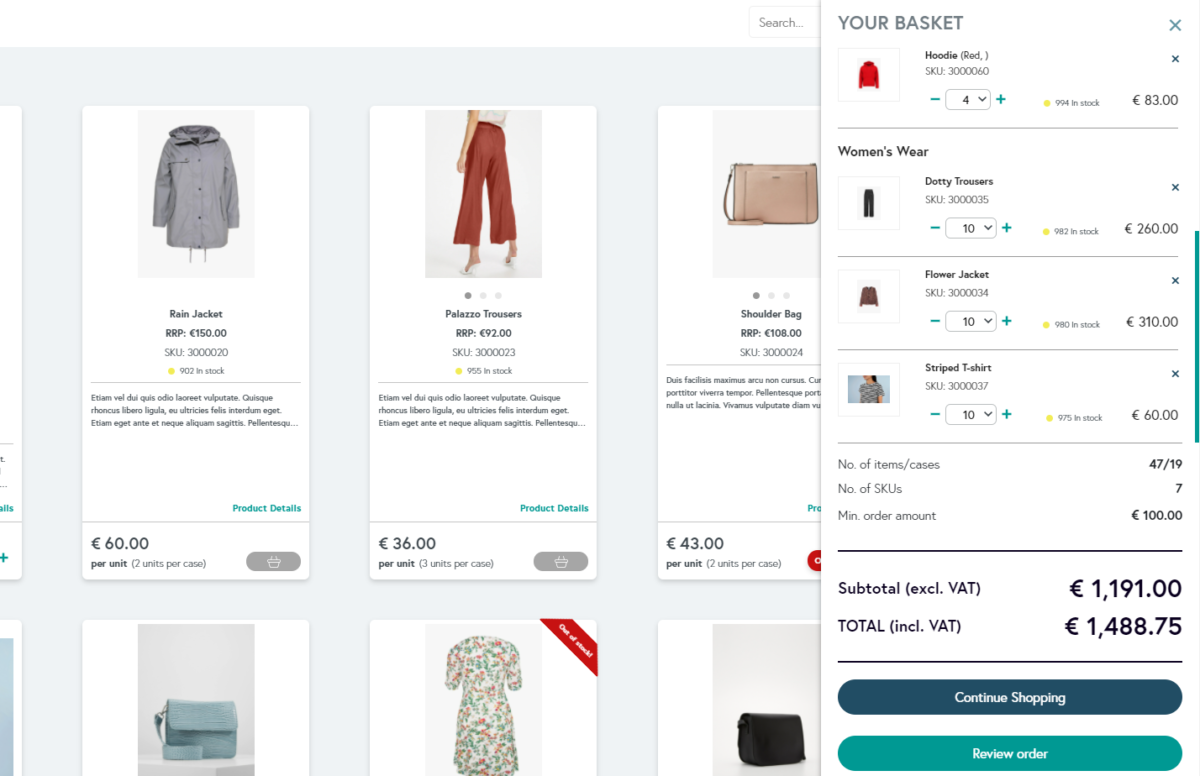B2B eCommerce platform: The definitive 2022 guide

Many people don’t fully understand the concept of B2B eCommerce. Not even those within the B2B and wholesale industry.
That is why we have written this blog post.
It serves as an introduction to all the concepts you need to know, to fully understand B2B eCommerce:
Table of Contents
Because we cover all aspects of B2B eCommerce platforms, we call this blog post the definitive guide to B2B eCommerce platforms.
What is B2B eCommerce?
B2B eCommerce is businesses-to-business electronic commerce, entailing the online selling of products and services to other businesses.
This can be both directly or via a marketplace. For companies to be able to do eCommerce between businesses, they will, in most cases, need what is called a B2B eCommerce platform (often a B2B eCommerce website).
So in essence, a B2B eCommerce is nothing other than digital order transactions among businesses. Since orders are executed digitally, manufacturers, wholesalers, distributors, and other enterprises realize high efficiency in serving the customers.
The basics of B2B eCommerce
Now that we have covered what B2B eCommerce is, we focus on the basics you need to know, to truly understand B2B eCommerce. The section will cover the following:
- B2B and wholesale
- B2B eCommerce platforms
- B2B vs B2C eCommerce
If you feel that you already have a good understanding of the basics, you can skip this section and move directly to the section on the benefits of B2B eCommerce (platforms).
B2B and wholesale
B2B is an abbreviation of “Business-to-Business” and simply describes the act of selling and buying products and services between businesses. In comparison, B2C is the act of selling from businesses to consumers. Read everything you need to know about B2B here.
Wholesale is the business of selling large quantities of products – usually at lower prices per unit. Wholesale often occurs in the form of wholesalers selling their products to a range of retailers.
B2B and wholesale are by many considered to be somewhat the same. And while they are in some sense similar, they are not necessarily the same thing. We would argue that while wholesale is almost always B2B, B2B is often not wholesale. A simple “example” might help understand the difference:
It is seldom that consumers are buying very large quantities of a product. Why would a single consumer ever buy 100 lamps, for instance? That is why wholesale is often taking place between businesses (B2B).
B2B eCommerce platform
It should be quite obvious from the name, “B2B eCommerce platform”, that it is an essential part of B2B eCommerce.
So what is a B2B eCommerce platform?
To answer this question we will introduce the most essential part of a B2B E-commerce platform; the B2B order portal (also sometimes referred to as a B2B webshop).
The B2B order portal is where your retailers order your products digitally.
After they log in, they can see the products, the prices, and general product information.
They then click on the product they wish to purchase, choose how many units they want, and finish the order. The entire purchasing process is quite similar to the one the retailers are used to as private consumers shopping online.

This is what it could look like to your retailers if you let them order through your B2B order portal.
The wholesaler will receive the orders from the B2B order portal via their B2B eCommerce software instantly and can begin preparing the order. No manual or analogue order handling is required.
Even though the B2B order portal is the most important part of a B2B eCommerce platform, there are also many other important features.
A B2B platform should include customer, product, and order management features.
It should include settings for tax, shipping, and general terms. Additionally, some B2B platforms offer dashboards with KPI’s and data visualizations.
Such dashboards can help the user gain insights into their business, customers, and sales.
B2B vs. B2C eCommerce
While eCommerce is widely implemented and appreciated in the B2C sector, the implementation of B2B eCommerce software has been much slower. As an example, only 40% of the Danish B2B companies had invested in B2B eCommerce in 2017. A figure that is actually quite high compared to many other countries.
The reason for this difference in implementation between B2C and B2B can be attributed to mainly one thing; the Difference in the complexity of sales.
In most cases, selling B2B is much more complex than selling B2C. The reason is that B2B and wholesale make use of a myriad of price differentiation. This could be unique prices for certain retailers, different discount levels for different customer groups, required minimum order amount based on currency, differences in shipping prices, etc.
When companies instead sell B2C directly to consumers, they rarely make use of any sort of price differentiation. All the consumers are treated the same and are offered the same prices and terms. This, of course, means that implementing a B2C eCommerce platform is much easier than implementing a B2B eCommerce platform.
Due to this difference in complexity, the prices of B2B eCommerce solutions have traditionally been much higher than that of B2C solutions.
This has naturally kept many small- and medium-sized B2B and wholesale companies from investing in a B2B eCommerce platform.
Luckily, the prices of B2B eCommerce platforms have decreased significantly in the last couple of years – something that we will get back to later in this post.
The Advantages of a B2B eCommerce platform
Having cleared the basics of B2B eCommerce and B2B eCommerce platforms, we turn to the benefits that they bring.
We are big advocates of B2B eCommerce software. We believe that companies of all sizes will benefit from investing in a B2B eCommerce platform.

We can’t guarantee you anything, but investing in a B2B eCommerce platform for your company is likely to make you happy!
There are lots of benefits to choosing a B2B eCommerce platform. And now we’ll cover what we believe are the 5 main benefits:
- Saving time and money
- Minimizing the risk of errors
- Happier retailers
- Better customer retention
- Increased order volume, size, and frequency
Saving time and money
If you own your own business (B2B, wholesale, or something else), you know that time is a valuable resource. It is however also a scarce resource. That is why you should try to save time where you can – and that’s why a B2B eCommerce platform is a great investment.
With a B2B platform, you will no longer have to answer (as many) questions from your retailers about prices and terms.
Instead, your customers have access to all the information they need via the order portal.
You will no longer need to spend hours manually inputting orders received on phone, email, and scanned order sheets. You will not need to spend time reviewing orders for mistakes – which is the topic of the next benefit.
Read our full post on how easy it is to convert an online B2B eCommerce platform.
Minimizing the risk of errors
A B2B eCommerce platform will greatly reduce the risk of order errors.
Your retailers are more likely to order the correct products when they can do it via your B2B order portal instead of on a phone or email. You and your colleagues are less likely to create order mistakes as a result of typos.
This will not only save you time but also decrease costs, resulting in faster delivery and happier customers.
Happier retailers
If you want to stay in business, happy customers are of the essence. This also goes for companies that sell B2B and wholesale. And while you can make your customers – the retailers – happy in numerous ways, one of the easiest is investing in a B2B eCommerce platform.
Surveys show that 85% of B2B customers prefer the possibility to order online instead of speaking with a salesperson. Especially when they are purchasing from a regular supplier. Don’t worry, it is nothing personal. It is just more convenient for them in this way. If you think about it, wouldn’t you prefer the possibility to do your shopping online as well?
Better customer retention
A B2B e-commerce platform is a great tool to improve customer retention. First and foremost, your retailers prefer to order via a B2B order portal as described above.
Many retailers are actually willing to change a supplier based on whether they offer a digital order solution or not.
Another way that a B2B e-commerce platform improves customer retention is by giving you a better overview of your retailers. We often hear from our customers that before they invested in our B2B eCommerce platform, they sometimes “forgot” smaller retailers. The reason for this simply was that they had no tools to keep track of their customers. The smaller retailers that ordered less frequently were often not given the attention they deserved.
With a B2B eCommerce platform, you have a constantly updated overview of your retailers. You can see their order history, and how long it’s been since they last placed an order. That way you will know when it is time to reach out to them again.
Increased order volume, size, and frequency
Last but not least, a B2B eCommerce platform is very likely to increase your sales. There are several explanations for this effect. Happier customers and better customer retention as described before certainly plays a big part. Another reason is the visual appeal that the B2B order portal brings with it.
Compared to printed spreadsheets and emails, a B2B order portal really showcases your products in the best light.

Want your order volume and size to go “up”? Then a B2B eCommerce platform is a great way to start.
A B2B platform also greatly improves your possibility to leverage the strength of data. When your customers navigate and purchase via your B2B shop, they leave data for you to utilize.
This will help you gain customer insights and improve your offers to them in the future.
Want to learn more about the benefits of B2B eCommerce? Then feel free to book a 30 min online demo of our B2B eCommerce platform:
Examples of best practices of b2b eCommerce
So, what truly defines a successful B2B eCommerce tool? Over the years that we’ve been in operations, we’ve collected a few good practices that could instantly boost your e-store. Here are our three favourites:
Building an alluring website
It all starts with having a professional online presence, with every vital detail within reach of your customers. People like visiting websites where they can check out products, cart them, and head out without asking them for unnecessary information.
This means that having quality offerings is as great as having an excellent website. Having a delicate balance between those two will not just get you ahead of the pack; it might ensure you stay there long enough to establish a lasting brand.
Online Chatbot
Let’s face it – you’ll not always be available to answer questions about your products and services. That is where a chatbot comes in. With these tiny online robots, your leads can get speedy help for your queries, portraying your business as helpful, efficient, and caring. And since people buy from those they trust, having this resourceful bot on your site will definitely set you apart from the masses.
Omnichannel experience
If there’s one thing that B2B buyers value, it would be customer-centricity. But don’t be thrown off balance by that phrase, it simply means focusing your business around the needs of your customers. That includes making it easy for them to do everything from inserting their preferred payment method, shipping, refunding, and so on.
In other words, consider wearing your customers’ shoes and imagine how seamless you’d want your buying experience to be every time you visit your store.

What are the B2B eCommerce trends going forward?
Ecommerce in general is changing, and the B2Bs have their fair share of changes cut out for them. To adequately stay afloat, eCommerce businesses should consider incorporating the following trends in their business strategies in 2022 and beyond.
Trend #1 Pay attention to new customers and user experiences
Initially, online sites for the B2Bs were only considered “portals” serving as catalogues. However, moving into the future, expect online stores to play a crucial role in customer acquisition and reviewing buyer experiences.
Research shows that more and more buyers are relying on online platforms for purchase decisions; meaning, businesses that ignore their eCommerce tools are at risk of missing out on nearly 50% of the current B2B traffic.
Trend #2 Embrace B2B Mobile Commerce
Mobile commerce is fast becoming a game-changer, and even the big boys are starting to notice its potential. The stats show that apart from having an online presence, you’ll need to make it mobile-friendly too. Companies, as well as individual consumers, enjoy the high convenience of doing business via mobile apps, perhaps due to two reasons. Firstly, apps allow you to sync your sales teams with your business system to pave the way for on-the-go sales. Secondly, mobile apps permit faster processing of recurring orders for your business account.
Trend #3 Loyalty programs for B2Bs
Initially, loyalty programs were considered an exclusive B2C strategy, but that is starting to change. Buyers are now expecting more than just timely orders from vendors; they need the motivation to keep doing business with you.
As a distributor or manufacturer, you stand to benefit from loyalty programs in terms of brand awareness, upselling and cross-selling opportunities, and customer acquisition. As such, consider having loyalty programs for your B2B customers in the form of referral rewards, transaction-based discounts, and periodic reward schemes.
Other trends include faster B2B order fulfilment, systems integration for multi-channel selling, and acceleration of online marketplaces.
The sum-up
There you have it. The definitive guide to B2B eCommerce. If you read it all the way through, we applaud you! It is a long text.
Think that your company is ready to enter the digital era and optimize its B2B and wholesale sales?
Launching Your First B2B Store?
Let us launch your B2B store with us today and boost your sales – no coding needed, just expert guidance with our People-to-People support every step of the way.
Book personal demo
